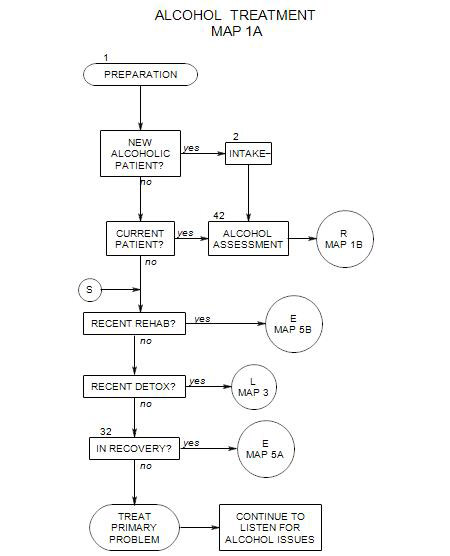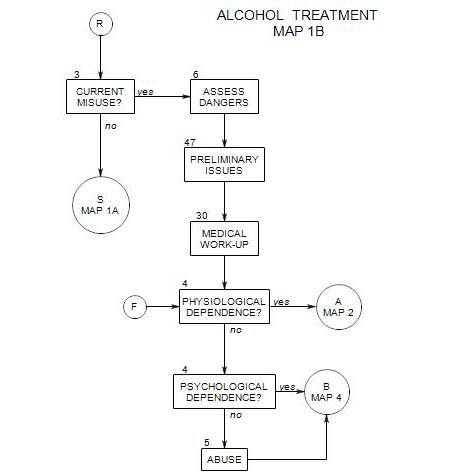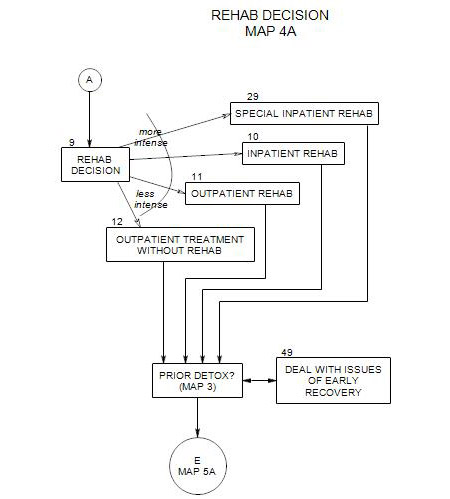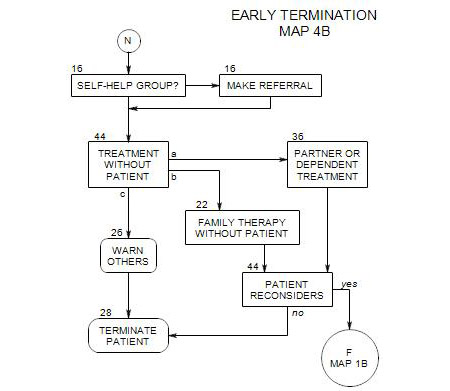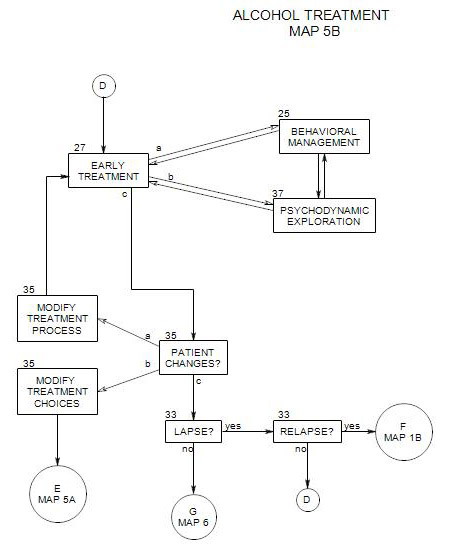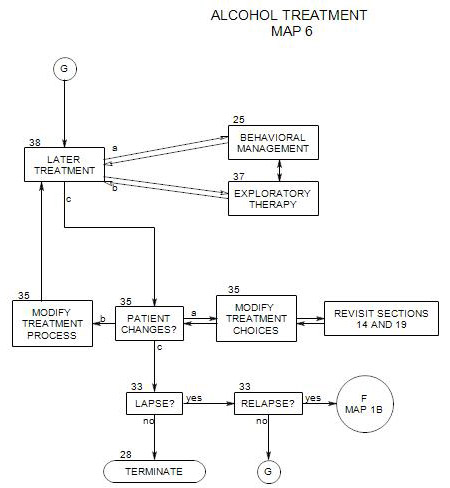48. MEDICAL TREATMENT OF CRAVINGS
- This section should be used together with Section 19 [Adjunctive Care Decision] or Section 27 [Early Treatment] or Section 38 [Later Treatment]
Several medications may be helpful in controlling alcohol craving and/or increasing abstinence, at least on a short-term basis. Although there is some hope in the literature for more effective medications in the future, at present no one is recommending the use of these products without concomitant therapeutic work or management.
There are legal restrictions on who may prescribe medications. However, it pays the rest of us to have some awareness of issues related to use of medications with our patients. In some cases, medical examination and blood work are prerequisites for medication.
48a. Medications
The following have frequently been used to reduce or eliminate dependence on alcohol. None has a perfect record, and the literature typically reports that patients receiving the medication studied had more abstinent days or reported drinking less or had fewer lost working days, etc., than patients receiving placebos. The following also ignores most side effects, which are major reasons for patient non-adherence.
Acamprosate (Campral™) was approved for treatment of alcohol dependency in 2004. It appears to increase the number of abstinent days in some patients, possibly by reducing the side effects [anxiety, restlessness, insomnia] of early abstinence. In some studies, both short-term and long-term relapse rates are decreased. It should not be used with patients who have impaired kidney function. Other side effects are typically minor and easily tolerated. Acamprosate can be continued during a relapse.
Baclofen may help some patients attain abstinence and can be used with patients who have severe liver damage. In one study, Baclofen patients stayed abstinent longer than placebo patients, fewer dropped out of the study, and they appeared to have some liver improvement.
Disulfiram (Antabuse™) has been in use for over 40 years and is probably the best known medication for treating alcohol dependency. It may be helpful to some patients by making the effects of drinking unpleasant. When a patient is maintained on a once-daily therapeutic dose of Antabuse, alcohol use produces a toxic reaction, including physical discomfort, dizziness, nausea, and vomiting. For most people, it remains inactive until the person drinks alcohol. It remains in the person’s system for several days, and the need to plan for drinking in advance may support abstinence. However, there are many issues and limitations to the use of disulfiram, including medical interactions and complications, serious risks for patients who drink, poor patient adherence, and weak evidence for effectiveness.
Naltrexone (ReVia™, Trexan™, Depade™) appears to reduce alcohol consumption in the short term, probably both by suppressing cravings and by decreasing enjoyment, and thus reduces the chances that an occasional drink will initiate a full relapse. People with either a family history of alcoholism or high levels of craving seem to benefit from naltrexone. However, there is a risk of liver damage, and treatment should include periodic liver function testing. Naltrexone can be taken in a once-monthly injectable form (Vivitrol™). A combination of naltrexone and acamprosate may be more effective than either one alone.
Odansetron (Zofran™) may help limit drinking by patients with early onset alcoholism, in which serious dependency begins before age 25, and where other medications have not been helpful. It has been suggested that odansetron has an impact where there is more of a biological component to the drinking.
Topiramate (Topamax™) is an anticonvulsant that can be effective in reducing the urge to drink, even in people who were actively drinking when they started taking the medication. It helps promote abstinence. It also appears safe for use with patients whose livers are compromised, and it may have a positive effect on hypertension, obesity, and cholesterol level. As of 2010, it has not been approved by the FDA for this use.
48b. Choosing a Medication
Here are some suggestions for treatment. Because the threat of relapse is greatest for the first year of sobriety, it is generally recommended that an effective medication it should be continued for a year or more. After that, psychotherapy should predominate, but medications can be re-introduced when a patient relapses. The following choices reflect major reported effects.
Timing: Patients should not be referred for medication unless they are well along in the stages of change [ Section 47 ], probably in the action or maintenance stage. Before that, the primary issue is helping them become sufficiently motivated so that they will use medication effectively.
Liver damage: If the patient has liver damage, then the only medications from the above list that are safe are Baclofen and topiramate.
Use with an Active Drinker: If a patient is actively drinking, the only medication from the above list that is likely to help him/her reduce alcohol input or achieve abstinence is topiramate. As an alternative, if the patient is clearly determined to stop drinking, then a brief course of chlordiazepam [Librium™] could be used to attain abstinence, followed by baclofen [if there is liver damage] or any of the others [if there is no evidence of liver damage].
In early abstinence, naltrexone and acampusate seem to be good choices for many patients.
Patient Reliability: Patients prescribed acamprosate must remember to take pills at several consistent times each day, which can be difficult for many people. An especially forgetful patient might be better served with a time release medication such as Vivitrol, if his/her liver function is within the normal range.
Early Onset Drinkers: For people who began serious drinking before the age of 25, with a family history of alcohol misuse suggesting an inherited predisposition, naltrexone, odansetron and topiramate may be the medications of choice
Late onset drinkers whose drinking is related to mood management may be helped by topiramate or by medications that address the mood problem directly. Some background information is necessary here, as mood issues can also be a consequence of drinking.
Intermittent Drinkers might best be served without medications. However, disulfiram may be helpful for abusers who drink episodically or impulsively. It can be started at a time of non-drinking, then take effect whenever the person tries to drink.
48c. Concomitant Treatment of Other Issues
Medication can be useful in treating comorbid psychological disorders, regardless of their relationship to the person’s alcohol misuse [cause, effect, or independent]. The prescriber of such medications should be sensitive to both emotional disorders and to alcohol misuse, in order to be able to weigh risks effectively; you should be in contact with him/her both before the prescription is written and on an ongoing basis; and the medication should be monitored closely.
Antidepressants are sometimes prescribed for alcoholics, to reduce craving and relapse, or to treat comorbid depression or panic.
Anxiolytics may be used as part of an inpatient detox program, but they are extremely risky with an active outpatient alcoholic [see Section 8]. With a recovering alcoholic, they mimic the effect of the patient’s drug of choice, leading to a high risk of dependency and renewed craving for alcohol.
On the other hand, they can be of substantial benefit to some patients when the risk of abuse relatively low. This might include some patients who have used alcohol to self-medicate for anxiety and who are likely to drink if their anxiety isn’t controlled effectively. Some may already have a chronic relapse syndrome [ Section 33 ].
The usual recommendation is to wait on these medications until a patient has been abstinent for a period of time, to see whether psychological symptoms are side effects of alcohol use. Then if the psychological issue persists, they can be prescribed more effectively.
On the other hand, some patients aren’t willing or able to be abstinent and may be anxious or depressed. You may suspect that their refusal to stop drinking has to do with mood management. It is possible that an antidepressant, anxiolytic or mood stabilizer could be of help, and might even reduce the need to drink. If so, this issue should be presented to the prescriber for consideration.
48d. Medication Adherence
Early contact with the medication prescriber can alert him/her to possible medical or treatment issues that the patient may not mention, and can lead to a dialog with some prescribers about the relative appropriateness or anticipated effectiveness of possible medications.
At the start of medication treatment, you may need to discuss several issues with the patient: [1] side effects to expect; [2] possible complications to watch for; [3] how long to wait before the medication is likely to be effective; [4] when and how to take a medication. How much to say is always a problem, and depends on a patient’s likely reaction to the information. Discussion of these issues should be coordinated with the prescriber.
This is a good time to consider ways to ensure patient adherence to the administration plan and to discuss ways to deal with missed doses. If another person will be involved in administering the patient’s medications, he/she should be involved in the discussions.
It may be important to stay in touch with the prescriber during the course of the patient’s use of medication, either directly or through the patient. As part of your treatment, you may ask the patient about his/her ability to adhere to the prescribed administration plan, as well as possible adverse reactions, the psychological impact of the medication, and its impact of the patient’s urge to drink. This information may be helpful to the prescriber.
If there are serious or unanticipated side effects, the prescriber should be consulted regarding their interpretation and the possible need for a change in regimen or medication.
References:
Chick, Jonathan. “Pharmacological treatments.” (2006)
Johnson, Bankole A. “Medication treatment of different types of alcoholism” (2010)
Swift, Robert M. “Medications” (2003)
Williams, Steven H. “Medications for treating alcohol dependence” (2005)
